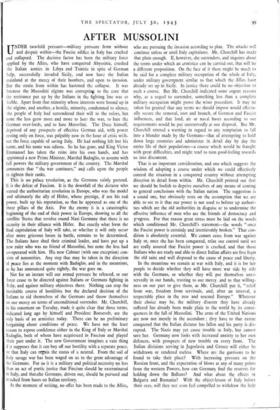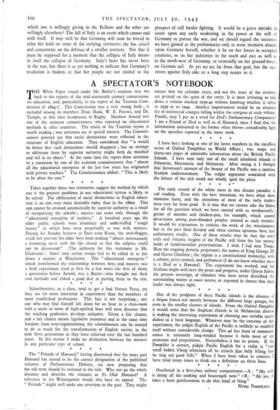AFTER MUSSOLINI
UNDER two-fold pressure—military pressure from without and despair within—the Fascist edifice in Italy has cracked and collapsed. The decisive factor has been the military force applied by the Allies, who have conquered Abyssinia, crushed the Italian armies in Libya and Tunisia in spite of German help, successfully invaded Sicily, and now have the Italian mainland at the mercy of their bombers, and open to invasion. But the strain from within has hastened the collapse. It was because the Mussolini regime was corrupting to the core that the resistance put up by the Italians in the fighting line was so feeble. Apart from that minority whose interests were bound up in the regime, and another, a hostile, minority, condemned to silence, the people of Italy had surrendered their will to the rulers, but none the less grew more and more to hate the war, to hate the German over-lords, and to hate Mussolini. The Duce himself, deprived of any prospects of effective German aid, with power resting only on force, was palpably now in the hour of crisis with- out the force capable of saving Italy. He had nothing left but his name, and his name was odious. So he has gone, and King Victor Emmanuel has taken the reins into his own hands, and has appointed .a new Prime Minister, Marshal Badoglio, to assume with full powers the military government of the country. The Marshal announces that "the war continues," and calls upon the people to tighten their ranks.
This is no palace revolution, as the Germans vainly pretend. It is the defeat of Fascism. It is the downfall of the dictator who started the authoritarian revolution in Europe, who was the model and ultimately the ally of Hitler, whose prestige, if not his real power, built up his reputation, so that he appeared as one of the three pillars of the Axis. For the enemy it is a catastrophic beginning of the end of their power in Europe, showing to all the satellite States that revolve round Nazi Germany that there is no security in their alliance with Hitler. But exactly what form the final capitulation of Italy will take, or whether it will only occur after more grievous losses in battle, remains to be determined. The Italians have shed their criminal leader, and have put up a new ruler who was no friend of Mussolini, but none the less had co-operated with him. His new Cabinet (with one exception) con- sists of nonentities. Any step that may be taken in the direction of peace lies at the moment with Badoglio, and in the meantime, as he has announced quite rightly, the war goes on.
Not for an instant will our armed pressure be released, or our force cease to be directed against Italians or Germans fighting in Italy, and against military objectives there. Nothing can stop the inevitable course of hostilitiq but the declared decision of the Italians to rid themselves of the Germans and throw themselves on our mercy on terms of unconditional surrender. Mr. Churchill, in his statement on Tuesday, made it quite clear that those terms, indicated long ago by himself and President Roosevelt, are the only basis of an armistice today. There can be no preliminary bargaining about conditions of peace. We have not the least reason to repose confidence either in the King of Italy or Marshal Badoglio, both of whom have acquiesced in Fascism and played their part under it. The new Government imagines a vain thing if it supposes that it can buy off our hostility with a separate peace, or that Italy can regain the status of a neutral. From the soil of Italy savage war has been waged on us to the great advantage of the Germans. For ua it is a military and political necessity no less than an act of poetic justice that Fascism should be exterminated in Italy, and thatathe Germans, driven out, should be pursued and attacked from bases on Italian territory.
At the moment of writing, no offer has been made to the Allies, who are pursuing the invasion according to plan. The attacks wilt continue unless or until Italy capitulates. Mr. Churchill has made that plain enough. If, however, she surrenders, and inquires about the terms under which an armistice can be carried out, that will be a different proposition. On the face of it there might be much to be said for a complete military occupation of the whole of Italy, under military government similar to that which the Allies have already set up in Sicily. In justice there could be no objection to such a course. But Mr. Churchill indicated some cogent reasons why, as a sequel to surrender, something less than a complete military occupation might prove the wiser piocedure. It may be taken for granted that any terms we should impose would effectu- ally secure the removal, root and branch, of German and Fascist influences, and that land, air or naval bases according to our requirements would be put unreservedly at our disposal. But Mr. Churchill uttered a warning in regard to any temptation to fall into a blunder made by the Germans—that of attempting to hold down large countries and administer in detail day by day the entire life of their populations—a course which would be fraught with great difficulties, and might tend to turn good-feeling towards us into discontent.
That is an important consideration, and one which suggests the wisdom of adopting a course under which we could effectively control the situation- in a conquered country without attempting direction in detail from within. Mr. Chutchill pointed out that we should be foolish to deprive ourselves of any means of coming to general conclusions with the Italian nation The suggestion is a sound one, but obviously rests on the assumption that we are able to see to it that our power is not used to bolster up authori- ties which are the old authorities in disguise or to undermine the effective influence of men who are the friends of democracy and rogress. For that reason great stress must be laid on the words which conditioned Mr. Churchill's statement—the words "once the Fascist power is certainly and irretrievably broken." That con- dition is absolutely essential. ,We cannot cease from war against Italy or, once she has been conquered, relax our control until we are really assured that Fascist power is crushed, and that those Italians who are ready and able to direct Italian affairs are free fr9m the old taint and well disposed to the cause of peace and liberty.
In the meantime we remain at war with Italy, and it is for her people to decide whether they will have more war side by side with the Germans, or whether they will put themselves unre- servedly in our hands, trusting to our mercy, and to that willing- ness on our part to give them, as Mr. Churchill put it, "relief from war, freedom from servitude, and, after an interval, a respectable place in the new and rescued Europe." Whatever their choice may be, the military disaster they have already suffered has already been made plain to the world by its conse- quences in the fall of Mussolini. The arms of the United Nations are now not merely in the ascendant ; they have to that extent conquered that the Italian dictator has fallen and his party is dis- rupted. The Nazis may yet cause trouble in Italy, but cannot save her. Germany now looks with increased anxiety to her own defences, with prospects of new trouble on every front. The Italian divisions serving in Jugoslavia and Greece will either be withdrawn or rendered useless. Where are the garrisons to be found to take their place? With increasing pressure on the Russian front, and the expectation of blows at any of many points from the western Powers, how can Germany find the reserves for holding down the Balkans? And what about the effects in Bulgaria and Rumania? With the object-lesson of Italy before their eyes, will they not soon feel compelled to withdraw the help which one is willingly giving in the Balkans and the other un- willingly elsewhere? The fall of Italy is an event which cannot end with itself. It may well be that Germany will soon be forced to relax her hold on some of the outlying territories she has seized and concentrate on the defence of a smaller territory. Not that it must be supposed for a moment that the collapse of Italy means in itself the collapse of Germany. Italy's heart has never been in the war, but there is as yet nothing to indicate that Germany's resolution is broken, or that her people arc not steeled to the prospect of still harder fighting. It would be a grave mistake to count upon any early weakening in the power or the will of Germany to pursue the war, and we should regard the successes we have gained as the preliminaries only to more intensive attacks upon Germany herself, whether it be on her forces in occupied countries, or on her industries in the south and east as well as in the north-west of Germany, or eventually on her ground-forces on German soil. As yet we are far from that goal, but the suc- cesses against Italy .take us a long step nearer to it.























 Previous page
Previous page